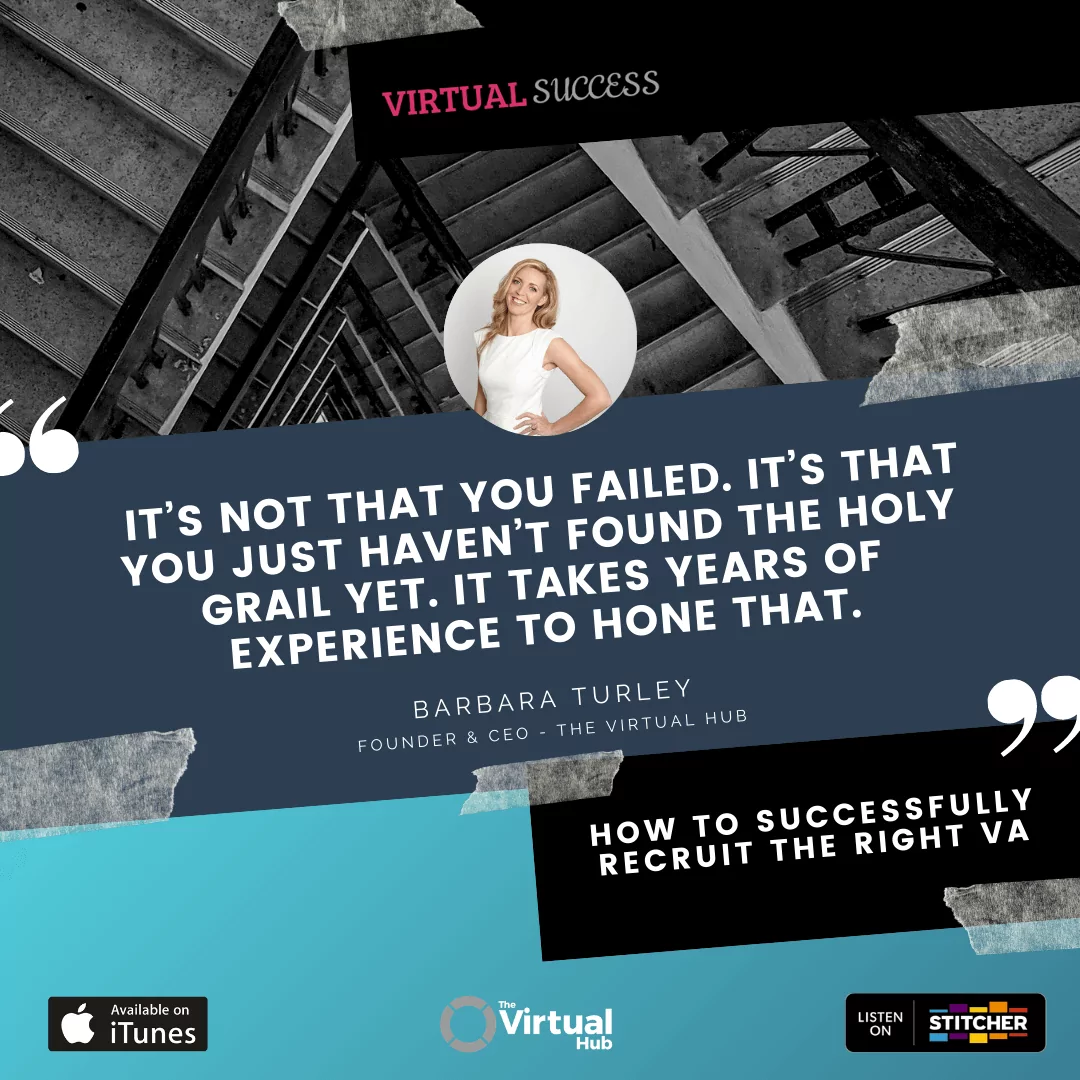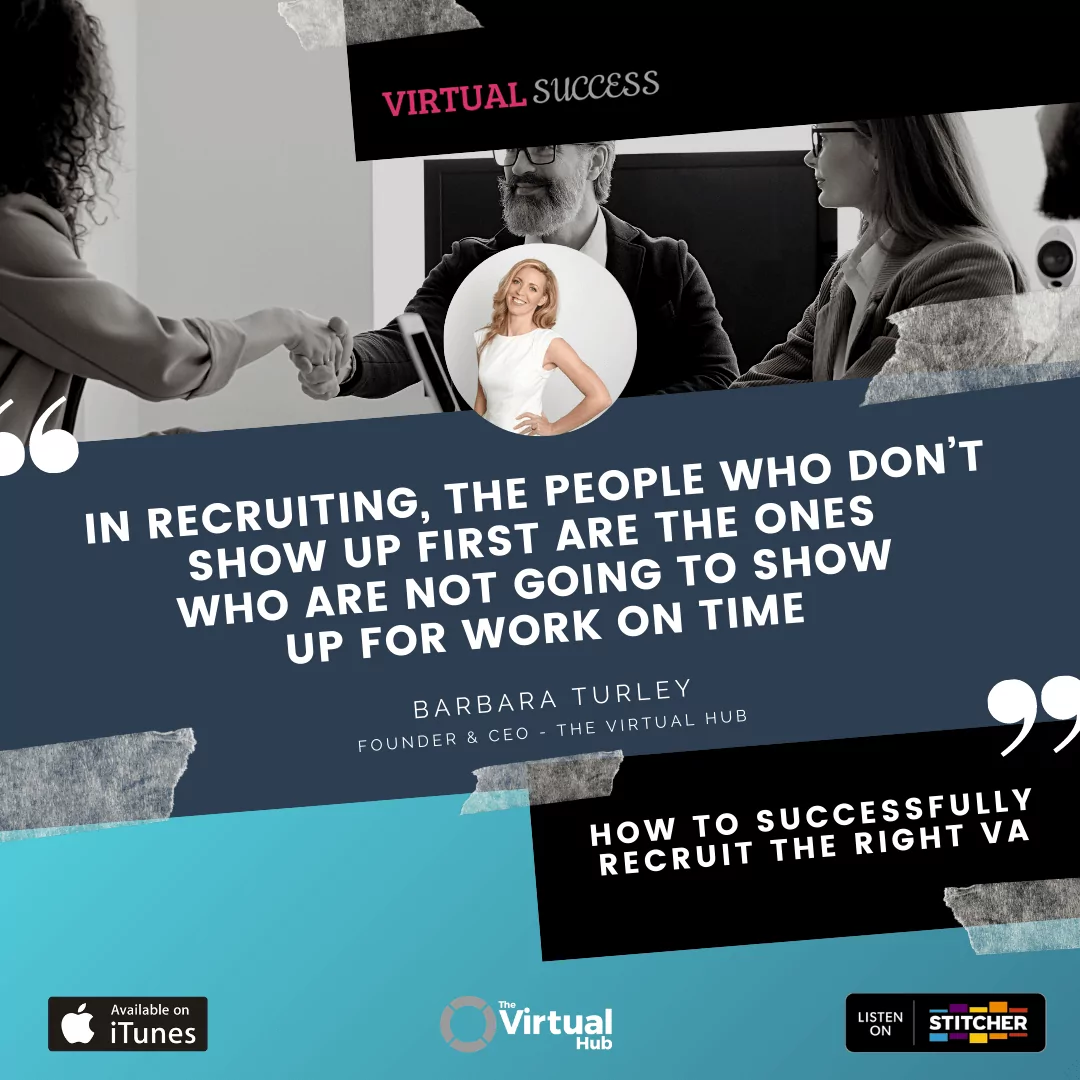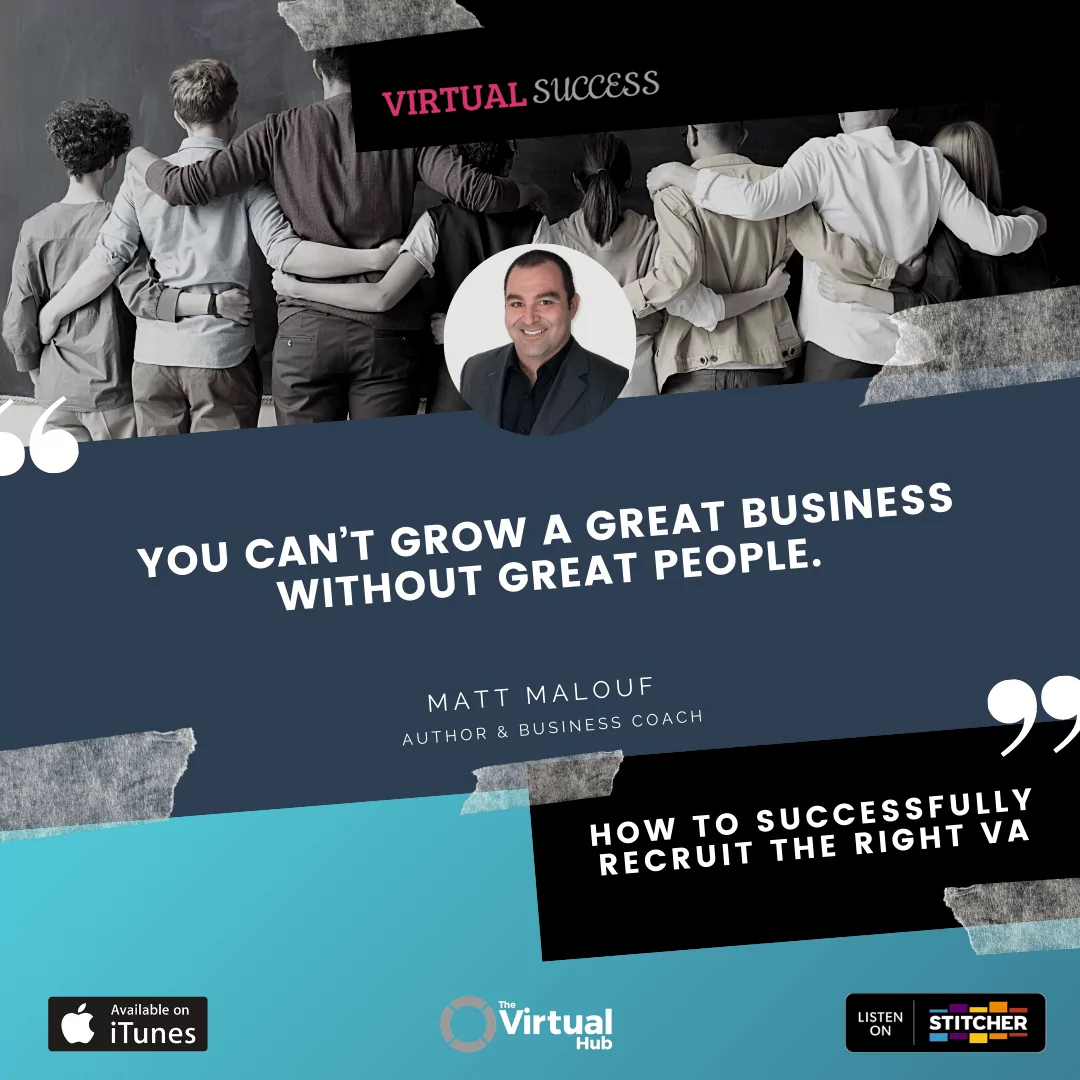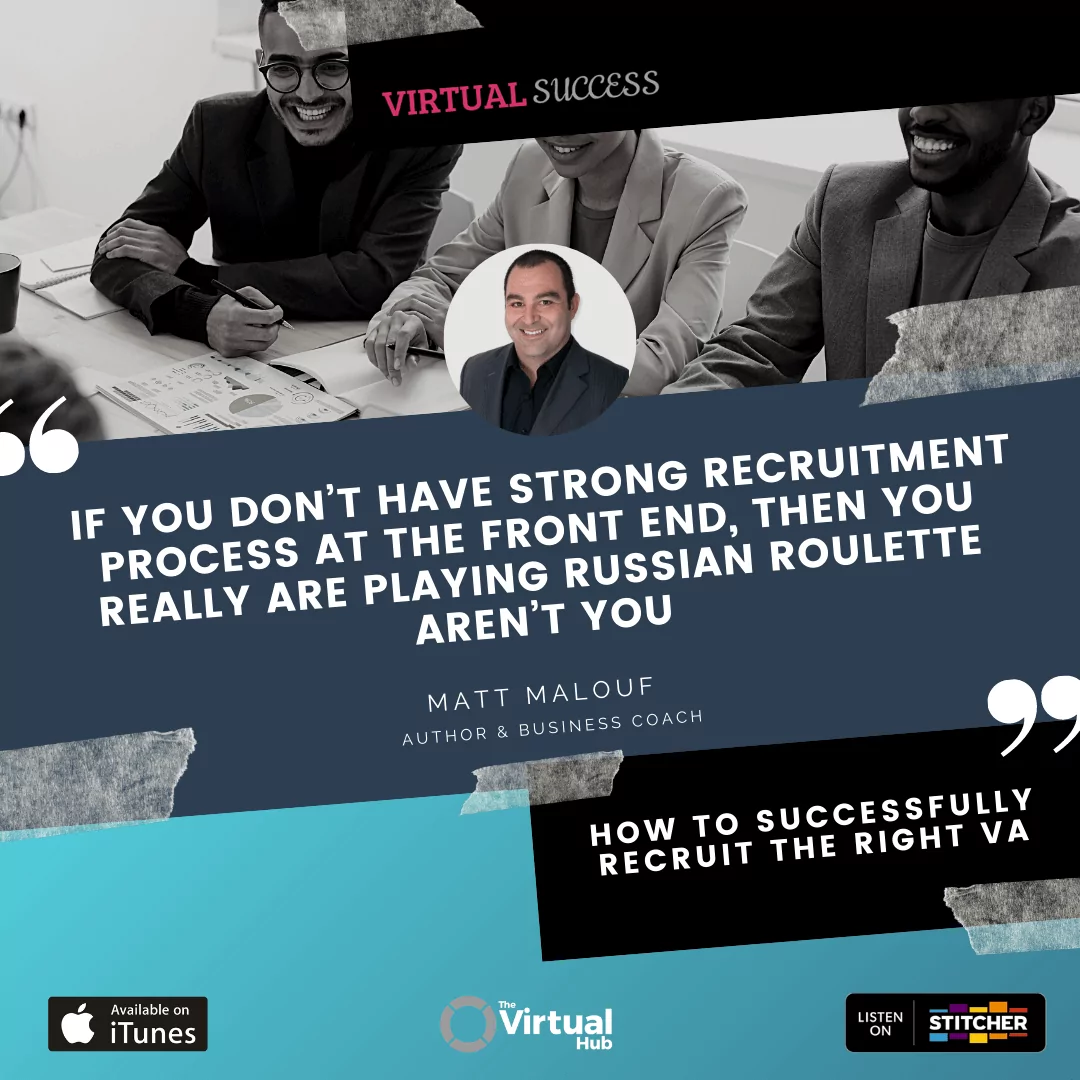How To Successfully Recruit The Right VA
Want the transcript? Download it here.
In this episode, Matt and Barbara talk about the importance of recruiting the right virtual assistant for your business.
During this episode, we talk about the in-depth process you need to have when recruiting from Overseas.
Some of the areas covered include:
- Barbara’s personal recruiting process
- Why taking your time during the hiring process pays off in the long run
- Why you need to define the culture of your business so you can identify the characters that will thrive in your workspace
- Why it’s important to have strong systems in place for your staff
Let us know what your key takeout has been from this episode and join the continuing conversation over in the Virtual Success Facebook Group.
In this episode:
1.17 – Recruiting the right VA
3.23 – Biggest fears around hiring an offshore VA
4.05 – Barbara’s personal recruitment process
5.18 – Steps to successful recruiting
14.58 -Why a trial period is so important
15.43 – Hiring an expert to recruit your staff
18.02 – staff character and work culture
25.27 – Local insights into what’s important when hiring a VA from the Philippines
27.10 – Recapping of the major steps
27.59 – Wrapping up
Intro: Do you find yourself running out of time to accomplish your work? Are you spending time doing things that you’re not that good at? There are effective ways to outsource these tasks, so you can focus on your business. This is the Virtual Success Show. We bring the inside scoop on outsourcing success for entrepreneurs by entrepreneurs, and now, here are your hosts, Matt Malouf and Barbara Turley.
Barbara Turley: Hey, everyone and welcome back to another episode of the Virtual Success Show where I’m joined by my co-host Matt Malouf. Hey, Matt, how’s it going?
Matt Malouf: Excellent, Barb. And yourself?
Barbara: I’m good. Now, where in the world are you today? Because I know you’re traveling a bit at the moment.
Matt: I am. I’m in the beautiful sunshine coast of Queensland …
Barbara: And is the …
Matt: … up in Noosa.
Barbara: The weather?
Matt: It is, it is. I went for a beautiful walk this morning along the river there and it’s balmy and humid as Queensland is this time of year.
Recruitment
Barbara: Yeah, Noosa is an amazing spot. Well, I’m based in my hometown of Sydney at the moment so it’s kind of wet and windy here today. Today’s show look, I’m really excited about today show because it’s a topic that’s close to my heart and it is we’re gonna tackle the difficulty in getting offshoring right and specifically the difficulty about recruiting because that is literally the first step to get right. I know I hear it all the time with clients coming to our business who sort of say, look I tried, I failed, you know, how are you different? That’s kinda what they … They’re burnt out from the experience of trying this and I know, Matt, you’ve had some stories like this as well.
Matt: Even just yesterday. A lot of the business coaching that I do we’re obviously trying to help people grow their business but also increase their margins and their profits and so using Virtual assistants is one great way of doing that. Getting great people to do things. Yesterday I’m in a meeting and as soon as I broached the subject the callers like, “Stop.” He actually put his hand up, stop. I’ve done it, it doesn’t work for me. I looked at him and I was like, this guys been in business for a long time. I’m like, “What do you mean it doesn’t? I’ve tried it, I’ve tried it, I’ve heard it all, I’ve read the books, it doesn’t work for me.”
Barbara: Absolutely, yeah.
Matt: I think what we want to really get out of this episode today is to dispel this myth because Barb and I have a belief that it can work for everyone. It’s simple but not easy.
Barbara: Yes, and I guess what I really want to show today, is you know, I’m running … We’ve got almost 120 employees now in the Philippines and I can tell you first hand how difficult it is, but how successful and how rewarding it is when you get it right. I thought one of the biggest issues people face is recruiting. It is one of our pain points, as well, at the Virtual Hub. It is probably the hardest part of what we do is right up there at the front at the recruiting end.
Barbara: Let’s dissect this. Matt, I thought, I guess on our sales calls that come through, one of the questions we ask is, you know, what’s your biggest fear about hiring a VA offshore? One of the most common things, it’s sort of three common answers we get, but one of the big ones is, “I’ve tried it in the past, it was really bad, I’m willing to give it one more shot.” We almost have to change their belief before they even start, which can be hard for us from a mindset point of view. Thankfully we tend to deliver most of the time, and our success rate is very high. I’m happy to share today the gold about how we get that high success rate. How does that sound?
Matt: I think it’s awesome, I can’t wait. Do you have a pen and paper, I’ve got a pen and paper ready to go and everyone should have a pen and paper ready to go because you’re about to get some amazing learning.
Barbara: Yes, I can just share with you that I literally have gray hair from trying to get this process right. First thing that I’ve said to people when they present this problem to me. I say, look, don’t beat yourself up. It doesn’t matter how successful you’ve been in business. In every other part of business. It doesn’t matter how big or small your business is. It’s irrelevant because this is a whole new thing that is actually extraordinarily difficult to get right. It’s not that you failed. It’s that you just haven’t found the holy grail yet. It takes years of experience to hone that.
Barbara: Just to give you a bit of insight, and I’m going to talk through these stats with you. I’ve just looked at the last six months of last year of our stats in recruiting and over 1000 people applied for a job with us. In the end after an excruciating six week period they have to go through. It takes about six weeks for us to whittle it down. We employed only 3%, right, now that is an extraordinary cost on our business. It’s exhausting actually. We have a huge team that have to manage that. Let’s talk about the reasons why. Okay?
Steps To Successful Recruiting
Barbara: First of all, you’ve got people that will apply for a job, and anyone who’s gone on a work would have noticed this. You’ve got a million applications for a job ad. Some of them won’t have even read the ad, right, so they’ll be the wrong applicant right off the bat. Of course, you have to whittle those people out. Then of the people who are kind of okay and look like we possibly could meet with them when we invite them, they have to come into our office to actually come in for the starting of the process. Over 50% of them won’t even bother to show up. They’ll confirm, but they won’t bother to show up at the time.
Matt: Yeah, wow.
Barbara: Now for me, it’s a bit like dating. If you were invited on a date and especially for women listening, and you’re sitting in a restaurant, and the bloke doesn’t show up? Well you would, I mean, you’re an idiot if you give him another chance or even take a phone call. For us that is like step one. We actually have a checklist.
Matt: For the guys on the show, for the guys, make sure you show up.
Barbara: Yeah. Like you know, half the battle is showing up. You will have like 50% of them you will not show up. It’s extraordinary for me to admit that, but that is actually the truth. Then of the people that do show up. Now here’s the clincher. Now, this is in the Philippines specifically, so anyone recruiting there … The people who don’t show up first are the ones who are not going to show up for work on time. They’re the ones that are not going to give you the work that you need. They’re going to be doing sloppy work, they’re going to say they will do it … They just basically, they’ve shown their character from the first moment of not showing up for the interview. If that happens, move on.
Barbara: Second test that most people fail. The next 50%, the majority of those that show up will fail our English tests. Now, English in the Philippines is a very strong second language. As you know, Matt their English is very good. The reality is, the level of English that a business owner requires from a virtual assistant is way higher than someone who’s just good at English. They need to actually be very highly proficient in English. We have a number of tests we put people through. One of which is called Berlitz. You can actually have a look at that. The Berlitz test, we look at that majority of people failed. Or they just, they don’t fail, they just get a very low level. That whittles people down, then like all of a sudden we’re down to kinda 20% of the pool at that point.
Matt: Let me pause you for a second, Barbara cause I think you bring up a really, really good point here. One of the issues, I mentioned the client I was talking to yesterday. He was like we recruit in Australia because we recruit locally, because we need someone that has strong English and understands the colloquialisms of our market. I’ve had virtual assistants all around the world and they understand, they have great English. I’m guessing it’s a really, really good point that you made because you understand the importance of it but you test for it.
Barbara: You have to test for it.
Matt: This is where I think, yeah, so most people would just have a conversation and make a judgment call, but because someone has great verbal communication doesn’t mean they have great written communication.
Barbara: Exactly.
Matt: Or that when they’re reading, and if you think about when you’re working with your virtual team. Much of that is in written language not verbal communication. I love that test. I think that’s unreal.
Barbara: Picking up nuances and you know as part of our tests, we don’t just do the Berlitz. We’re actually quite mean what we do to them but they have to sit like a five-hour exam when they come in for their first session with us. One of the reasons we are doing it is because we want to be fair to them as well. The reality is if we were to employ some of those people, they would never survive. The client experience would be terrible and then they’re experience as an employee of ours would be terrible.
Because we would have led them down a path that they’re never going to succeed. It’s much better to just be realistic about this upfront. Test written language. As you say an interview is not enough because people can say anything in an interview. We also get them to write a written piece about why they feel we should hire them. We don’t just ask them questions, we ask them to write that on an application form. We get a sense of what drives them, because people, people, you pick up little small things in how people write about themselves. That’s really, really key points to remember. Communication style, English, like you know show up. These are kinda step one and two.
For us then, because we’re more in a digital marketing kinda focused place we need to test for things like… We do a little test around branding to see who has an eye for detail or an eye for color. Now, we don’t hire designers, but some people have a natural eye for that. Let’s say you are hiring someone that you would like to be involved in your Instagram account or your social media. Well, you may not need to hire a designer. You may just need somebody who has taught themselves Photoshop, who is into photography, who’s quite creative in their own way. That can be enough for social medial, for example. We don’t cut people out at that point. We just want to kind of grade where their strengths lie.
Barbara: Now the next step after that for us is, you need… with a virtual assistant and you know this Matt. They need to be able to follow instructions. They need to have attention to detail. The next step for us and I would strongly urge someone to do this. Give them a task that has a couple doozies in there, like a … Sort of a slightly vague construction. See how they cope with that and then very specific instructions and see how much of it they pick up. You want to be very metrics-driven with this stuff. This is before you ever meet the person, right? You don’t have an emotional connection to them. You can purely grade them based on, did they get this instruction, this instruction and this one. The top three. Did they miss instruction four. How did they do on a slightly vague instructions in making their own instruction. Does that make sense about how you would do metrics driven?
Matt: 100% and the thing I’m loving about this Barb is, we hear this quote, it’s very cliche. Higher slow, fire fast. What I’m loving with this is your process, whilst for many, I mean you talked about a six-week process.
Barbara: Yes.
Matt: That’s unheard of and I love it because one of the biggest gripes people have in business is my people aren’t doing what I ask them to do, or I can’t find great people, or etcetera, etcetera. The beauty in what you’re doing and having … I can understand now why the quality of the people that you place and we hire. People from your team as well. Why their quality is so high, because the Virtual Hub takes them through this beautiful process. I love how you position it and it’s so true. Please hear what Barb said, “It’s in their best interest as much as it is yours.” Because the last thing you want to do is set someone up to fail.
Barbara: Yes.
Matt: This process is just, it’s unreal.
Barbara: Recently, for those that fail for example. Let’s say those that come through that, the ones that don’t show up we don’t bother but the ones that actually went through this process and actually sat down for the hours in our office and tried really hard. We don’t just say, “Sorry you failed.” We actually send them away with some pointers. We tell them how to succeed and we say you can reapply in six months time. We’re saying to them, you can go away and take what you’ve learned today. You can study how to become better and if you really want this, we’ll see you in six months time. We’ve had a few successful hiring that actually came back. Now that shows great determination and they’ve said in their interview when they came back, eventually, we do get to interview. The comment was, “I wanted to work for this company.” Because they just saw it was excellent to what we we’re doing and they want to be excellent. That’s kinda what we need, it’s what any business owner needs.
Barbara: Now the only thing I would say is it’s a six-week process and on average 220 people per month apply for a job with us. What I want to say with that is don’t deceive yourself as to how hard this is and the resourcing you will need to put behind finding the right fit. Particularly in the Philippines ’cause there’s a lot of people over there and you have to filter. You know, that’s a plug for my company. That’s why people like to come to us. On the flip side and here’s the real clincher. After all that time, sometimes what you would think, “Well, if you get people with experience or the right people with experience coming through, surely they should blitz that test.” Yes, they do, but what we find is in the interview we can sometimes pick up some character flaws or things that we don’t particularly like that are not a cultural fit for us. Often those people will get turned away, even though they have the right experience we can just feel they are not the right cultural fit.
Barbara: The other thing we notice is, after we eventually do interviews. Then we put them into a three-week intensive training program that we pay. We actually employ them as full-time employees and their first three or four weeks with us is this training program. You would not believe the amount of people that go into the training program but don’t come out the other side because it’s work ethic. You see the whites of their eyes over three or four weeks and you can pick up character, work ethic, values, cultural fit and sometimes we’ve let the most experienced people go because they don’t culturally fit with what we are doing. Hope that makes sense.
Hiring An Expert To Recruit Your Staff
Matt: It does, it does. Here’s why I think having an expert do this is so important. I know in all the businesses I work with very few people would actually have the time to invest into this. What happens is we make quick hiring decisions that don’t go through a thorough process like this and then out the back of poor experience make the judgment call that this can’t work for my business, or my business is different. What Barbara’s explaining today is vital for the success of your companies. It really is because you can’t grow a great business without great people.
You can’t build a great team and have great people without a great recruitment and onboarding process and you could ask any expert that. I’ve literally studied this for around the world. This is universal. It’s not isolated to any industry sector. It’s not isolated to any geographic sector. It’s universal and really understand the detail of this process. Not only that, Barb and I’m sure you’re happy to talk about this. You’ve got experts that are vetting these people, they’re not just anyone and everyone who is part of your recruitment process. These are trained recruitment professionals doing this.
Barbara: Yeah and I’m quite heavily involved myself so one of the things people who are inside the Virtual Hub will notice is that I’m more involved in the operational end of things than I am on the client side. The reason I made that decision a few years ago is that I realized that the actual, the crucial thing for us to get right is the recruitment and the people we hire. Because they are the ones that then deliver success for a client. You know it’s better for me to sit on that side and keep a tight leash on that side of things and allow others to manage the client side, if you know what I mean, because that gives us success.
Staff Character And Work Culture
Barbara: Now, if you’ll notice from everything I’ve said. People always talk about A-players. Everyone goes, I want to hire A-players, I want to hire people with experience. In my opinion and it’s just my opinion you want to hire smart people that have the right character. Now character is something you’re born with and it’s breed into you as a child. You can’t teach it. You have to find people who are smart with the right character, the right work ethics and are enthusiastic about what you are doing. Because those things you can’t teach. Skills and processes and everything else you can teach, as long as you have got the right character and a person whose smart enough with the right level of English, for example. Sometimes our clients find this frustrating because this is where we’re different from a traditional recruiter, for example. A traditional recruiter might do a few tests. They’ll get a massive bank of resumes and they’ll just keep showing you people that they’ve interviewed.
Those people will not have been through a process like this. Therefore, the attrition rate and the failure rate is actually higher in those kinds of businesses and that’s why some people will say, well I went through an agency before and it was a disaster. Unfortunately, it’s because it’s this difficult. But that means our lead times are longer sometimes clients get frustrated because they only need two people, but our success rate is high. So I just wanted to add some context for how difficult it is.
Matt: Yeah, absolutely and I can’t stress enough, this, we hear about this … I love when you talk about character and that you can’t teach this. You know the number of times I’ve seen this happen where often you’ll make a bad hiring choice and choose the wrong character alignment when you are hiring too fast. You don’t have a strong process. But also too, you haven’t actually clearly articulated, and sat down. What are the values of our company? What is important and how do we align to that? You know, on previous shows, Barbara, we talked about systems and processes and the like. If you get someone who’s, as Barbara said, smart with the right character, you plug them into your system, your business system. They look like superstars.
Barbara: Absolutely, and then getting onto this business system thing. If you’ve got a rockstar business system and you take ownership of that system yourself you can plug any virtual assistant into that. As long as you’ve gone through this kind of process. All you need is a great person who’s smart enough and who is the right cultural fit. Processes, you’re not asking them to develop processes because they don’t have the context across your entire business. Asking virtual assistants to create processes in your operations manual for you, well, some of them can help you with it. Some clients are really misguided in how they’re thinking about virtual assistants. As we’ve talked about many times. And therefore they try to hire people they’re almost looking for a skill set that almost doesn’t exist and in the Philippines, people will make it up. They will actually tell you what you want to hear in interviews.
I haven’t even touched on the HR aspect, which is things like background checks. You know, like nobody’s doing proper background checks, but because we’re a Philippine company with local HR staff we can check police records. We do full medicals, so we can tell if somebody’s taking drugs, for example. We’ve had that. We’ve had someone go right to the end of our training program, get hired and then we had to let him go because his medical came back with some dodgy stuff. You know you would never pick that up unless you’re being this rigorous.
Matt: I love this.
Barbara: That’s the tough part, right? It’s what keeps me awake at night, is the, is the medical.
Matt: It’s interesting, it’s interesting though, Barb. I remember so, I’ve been using virtual assistants now for probably the best part of eight years and in the early days I hired direct myself. Largely because the Virtual Hub didn’t exist. I used to always be … You’d get their resumes and it was like a roll of toilet paper with all the things that this person could do and I’m like, “Wow. This person is a superhuman. It’s unbelievable the experience,” but to your point. A lot of the time they were just telling me what I wanted to hear, and they were trying to wow me. They may have used a particular piece of software or you know …
Barbara: Or heard it. Or just heard of it.
Matt: Yeah, and that’s on their resume. You would have seen it as well and to the trained eye, you start to learn that this is now the way it is and unless you have a really, really strong and proven recruitment system, unfortunately, you’ll make the wrong hiring decision. I think, look we’ve all made those mistakes. The only way that Barbara’s process is as strong and gets such great results is not because of the all the success she’s had with it. It’s all the mistakes that she’s made in the past.
Barbara: Oh yeah, I’ve been burned too.
Matt: That brings her to this point.
Barbara: Yeah, like I mean we’ve refined this over years and years and years. You only learn this from doing it at scale. You know like, hiring at the volume that we need to hire. We can’t even hire as fast as we need to but you know, we sort of see ourself as protecting the client. If a client comes to us, I’ll be honest, not every client is down with it. Some clients would prefer a pure recruiter and that’s fine but I’ve even looked at what would happen if we were to lower slightly our English test results. My recruiters were saying to me, they’ve been doing this a long time. They said to me, Barb, “No because we don’t even get people.” It’s either like a clear pass or fail. We don’t get people that are borderline. If they get a borderline, someone who almost pass they tend to bring them through to the next level just to see how they go.
I’ve tried increasing it but it’s actually just recruiting and hiring people is a tough game. It’s tougher in the Philippines because culturally there are, you know, they are still behind and I don’t mean this in a derogatory way. You have to remember that an industry like the call center industry has exploded in the Philippines in the last 10 years in particular. With that bring shady cultural practices within businesses that don’t treat their staff well. You know, so therefore you get a culture of people who don’t care. You know, they just go for every job interview and that’s why they don’t show up. It’s not that they’re inherently bad people. It’s just the culture right now in the Philippines is churn and burn. You don’t want to get caught up in that because that’s what it’s like. That’s a bit of just cultural insight there.
Matt: Yeah. More and more people are now open to using a virtual assistant. The whole supply and demand curve is shifting. There’s still a huge supply but you’ve got to look at the quality. The great people often and this is in most markets around the world are in jobs.
Barbara: Absolutely, yeah and they are hard to head hunt out. It depends, if you’re just hiring contractors what you have to remember is people like me who have companies over there. The stuff we’re offering staff is stuff you can’t offer them. Because you’re not in the Philippines. We have the highest level of health cover. We’ve got, we understand all the labor code. All the Philippine public holidays and how to navigate that. What they care about, you know, what’s important for them. For example, I’ll give you a tip. What’s very important for the Filipino’s is to have their children under the private health cover. That you will have someone work for you for life if you can get their kids on it. You know, having a local company gives me a lot of advantage in that, in that I can deliver a lot of those things. That means you can attract great talent by having culture like that. It doesn’t mean you couldn’t do it getting you’re own freelancers or contractors. You just got to be aware of all these dynamics, I guess, that are there.
Matt: Absolutely.
Barbara: Yeah, that was actually good for me to share that because I’ve realized the depth of what we do.
Matt: Yeah, it’s amazing and like I just you know. I think this is one of those shows that everyone should go back and listen to a few times because there was so much gold that you were sharing and if you took nothing else away from this. Understand that in order for virtual assistance to work in your business, it actually starts with a strong recruitment process at the front end. If you don’t have strong recruitment process at the front end, then you really are playing Russian Roulette aren’t you. It’s a gamble. It really is.
Barbara: I mean if I was to say the steps, you need. First off you need this recruitment. This depth of recruitment process. Then as we’ve talked amount at nauseum on this podcast, it’s the strength of your business process and your engine that you’re going to plug this person into. And then the next bit after that is your things like HR, employee engagement, treating people like their part of your coulter. All that sort of stuff and if I could think about, those are kind of the three big prongs of how you can, how you get loyal, engaged, happy people who love working for you and will build your company for you. If you don’t get those three things right you will, you can end up very frustrated.
Matt: Yeah, well, Barb just in closing was there anything else you wanted to add? Cause I’ve got two pages full of notes here. It’s been amazing. Is there anything else we should … You know, having that right process, treating them right. The thing I would add is just, it’s making sure you don’t cut corners.
Barbara: Yeah, don’t. You’ll pay for them later.
Matt: Yeah, it’s too often you will. I see so many people going, I don’t need do a reference check. I don’t need to do the English test. I spoke to them and they’ve got great English. The moment you cut corners on a proven process. It exposes you to challenges.
Barbara: Yeah, and look the thing I would add to that is be 80% metrics. 20% personality. ‘Cause they have to be a right personality fit for you. Do the metrics part first so all your testing needs to be metrics based so that you’re unemotional. ‘Cause if you’re like me, the minute you meet someone … I’m not allowed to interview people. I think I’ve shared this before because I just fall in love with everyone. And I see the best in everyone and I want to give everyone a job. It’s better for me, like I don’t get involved in any of the meeting of anyone, but I just look at the data.I’m supplied with all of the data and the decision making from my team. Yeah, just stick to your metrics and the same goes for KPI’s and when you’re eventually growing people within your business. Try to focus a lot on the metrics side of it so that you’re actually getting real data that you can make proper decisions on. Cause on the end of the day you are running a business, not a charity. I’ll finish on that.
Matt: Fantastic, well, thank you Barbs. Thank you so much for sharing this with us today. It really is… I just think it’s so generous of you to share this process with everyone.
Barbara: I just love how for the listeners how we come up with these shows. Sometimes Matt and I are just shooting the breeze and we’re like, “Hey, this happened this week or we’re like that will make a great show. Yeah, let’s do it.” We just do these shows so these are real, you know, nuggets of information that we share. We find that through our own discussions we come up with good ideas for the show.
Matt: Yeah, and just on that, if you’ve enjoyed this episode and others, we’d love for you to leave us a review. Share it out there in social media and also too, if you have any particular area you would like us to do a show on, a challenge you’re having, wins that you’ve had when it comes to your virtual team. We’ve got the Virtual Success Facebook group. Please, share that with us or reach out to us. We’re always looking for great show ideas, but other than that, Barb, you have an amazing day and I look forward to our next show.
Barbara: Yeah, great. Thanks guys.
Outro: Thank you for listening to the Virtual Success Show. If you found this show helpful, take a moment to share it with a friend so that we can all grow together.
The Hosts
 Matt Malouf
Matt Malouf
Matt Malouf is a passionate business coach, speaker, author and entrepreneur on a mission to help entrepreneurs around the world break the shackles of mediocrity and reach new levels of personal and business success.
 Barbara Turley
Barbara Turley
Barbara Turley is the Founder & CEO of The Virtual Hub, a company that specializes in recruiting, training and managing superstar ‘Virtual Assistants’ in the social media, digital marketing and systems automation space.





 Matt Malouf
Matt Malouf Barbara Turley
Barbara Turley